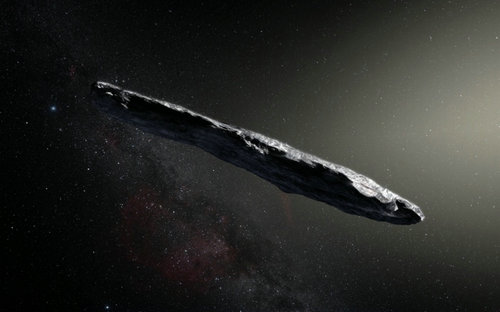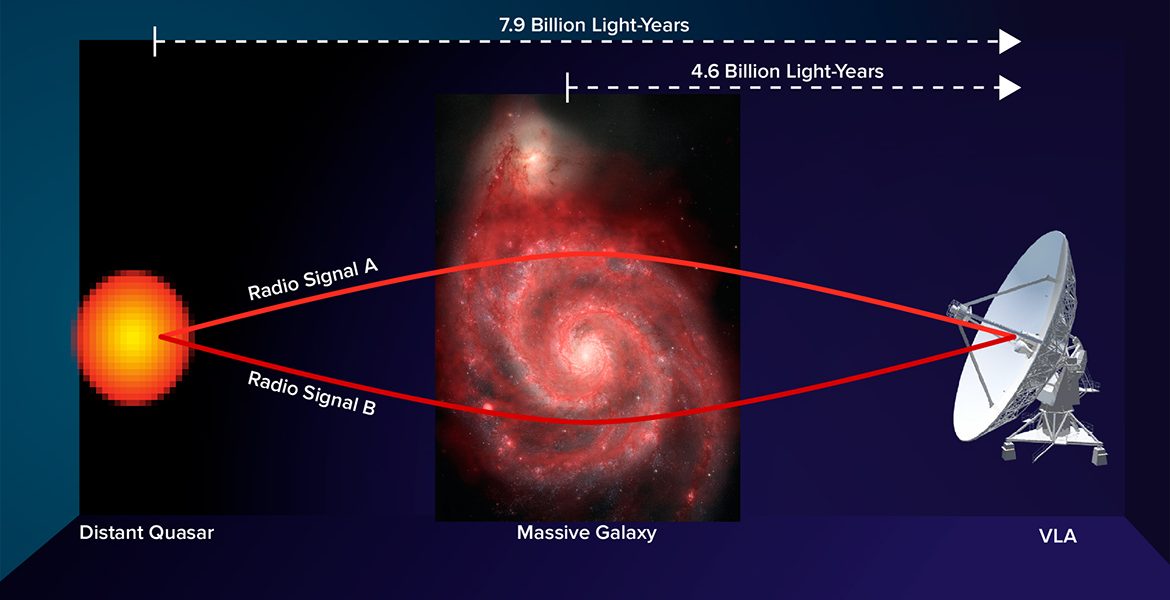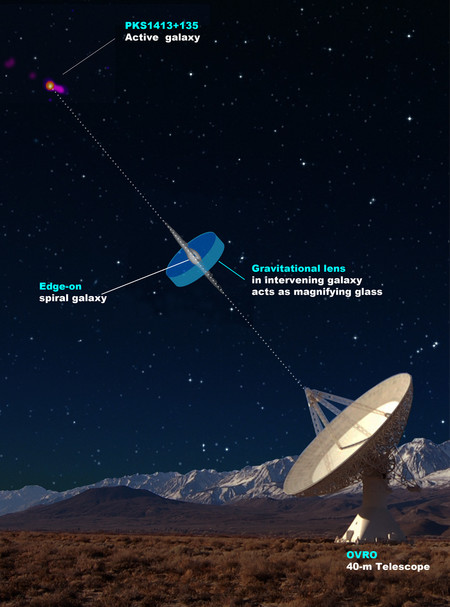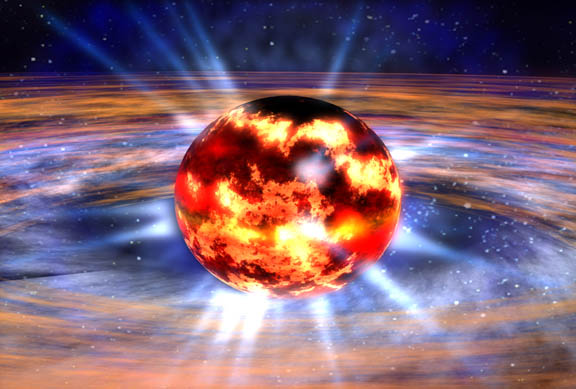搜索结果: 1-15 共查到“国际动态 星系天文学”相关记录158条 . 查询时间(4.765 秒)
美国发现具有大恒星能量的微小星系
大恒星能量 微小星系 引力透镜
2023/8/21
美国明尼苏达大学科研团队利用詹姆斯·韦伯太空望远镜(JWST)的首次观测,发现了一个独特的微小星系。该星系以极高的速度产生新的恒星,是在这个距离(大爆炸后约5亿年)发现的最小星系之一,可帮助天文学家更多地了解宇宙诞生后不久就存在的星系,研究早期星系的形成方式。相关研究发表在《科学》上。
美国绘制出中子星系统阵风图
中子星系统 阵风图 吸积盘
2023/8/21
美国麻省理工学院天文学家在大力神X-1(Hercules X-1)中观察到了更广泛的风带,在该系统中,一颗中子星正在从一颗类太阳恒星中吸取物质。这颗中子星的吸积盘在旋转时会摆动或“进动”(precess)。通过利用这种摆动,天文学家首次捕捉到旋转圆盘的不同视角,并创建了盘风的二维地图。新地图揭示了风的垂直形状、结构、以及速度(约每秒数百公里或每小时一百万英里),这是吸积盘可以旋转的较温和的一端。

横跨1630万光年!迄今最大星系发现
低频阵列 最大星系 “阿尔库俄纽斯”星系
2022/2/23
据美国《趣味科学》杂志网站近日报道,荷兰莱顿天文台科学家报告了迄今观测到的最大星系,其离地球30亿光年远,自身横跨1630万光年的距离。对其开展进一步研究将有助于弄清星系如何生长变大。研究人员在仔细研究了“低频阵列”(LOFAR)收集的数据后,首次发现了这一新的重量级星系。LOFAR是一个由分布在欧洲52个地点的约20000台射电望远镜连接而成的网络。在对数据进行处理后,研究人员检测到了巨大的反射...

新研究发现月球表面仍在释放碳(图)
月球表面 碳 大阪大学
2020/5/17
月球是如何形成的?这一直是个未解之谜。有一种被广泛接受的理论认为,月球由地球和一颗火星大小的星体碰撞产生的碎片形成,这种碰撞产生的高温会使与月球上的挥发性化合物都挥发掉。但据英国《新科学家》网站7日报道,日本科学家的最新研究发现,月球上现在仍然存在挥发性碳,这表明月球形成时的温度较低,因此,这一发现对上述月球形成理论提出了挑战。

中国科学院国家天文台联合揭示星际来客“奥陌陌”起源(图)
中国科学院国家天文台 奥陌陌 星际天体 自然-天文
2020/4/14
人类确认发现的第一个星际天体奥陌陌的起源刚被揭晓。北京时间4月13日,国际学术期刊《自然-天文》(Nature Astronomy) 在线发布了中国科学院国家天文台博士张韵与美国加州大学圣克鲁兹分校教授林潮的研究论文,揭示了这类星际天体的形成机制和成为星际天体的过程。论文提出的新模型表明奥陌陌可能是被原行星系统中恒星的潮汐作用撕碎并甩出的碎片,数值模拟结果首次全面系统地复现了奥陌陌的所有特征。
天文学家发现土星上一种新型风暴
天文学家 土星 新型风暴
2019/10/25
西班牙研究人员于2019年10月21日在《自然·天文学》在线报道说,他们借助望远镜拍摄的图像,发现土星上存在一种新型风暴。该风暴于2018年在土星北极附近肆虐,其比土星上其他风暴大,但比著名的大白斑小。据英国《科学新闻》网站21日报道,迄今为止,天文学家仅见过两种土星风暴:宽约2000公里、持续几天的相对较小的风暴以及大10倍且持续数月的大白斑(Great White Spots)。而新“现身”的...

Massive Primordial Galaxies Found In ‘Halo’ Of Dark Matter(图)
Massive Primordial Galaxies Halo Dark Matter
2017/12/19
Observations of two galaxies made with the National Science Foundation-funded Atacama Large Millimeter/submillimeter Array (ALMA) radio telescope suggest that large galaxies formed faster than scienti...

IMAGE RELEASE:Shocking Results of Galaxy-Cluster Collisions(图)
Shocking Results Galaxy-Cluster Collisions
2017/11/23
A giant collision of several galaxy clusters, each containing hundreds of galaxies, has produced this spectacular panorama of shocks and energy. The collisions generated shock waves that set off a cel...

With the help of a gigantic cosmic lens, astronomers have measured the magnetic field of a galaxy nearly five billion light-years away. The achievement is giving them important new clues about a probl...

UChicago scientists detect first X-rays from mystery supernovas(图)
UChicago scientists first X-rays mystery supernovas
2017/9/5
Exploding stars lit the way for our understanding of the universe, but researchers are still in the dark about many of their features.A team of scientists, including scholars from the University of Ch...

Cosmic Magnifying Lens Reveals Inner Jets of Black Holes(图)
Cosmic Magnifying Lens Inner Jets Black Holes
2017/9/5
"We have known about the existence of these clumps of material streaming along black hole jets, and that they move close to the speed of light, but not much is known about their internal structure or ...

In Hunting Supernovae,'Get Them While They're Young'(图)
Hunting Supernovae Get Them They're Young
2017/9/5
Not many people can say they have watched a star explode before their eyes, but David Sand can.On the evening of March 10, the astronomer happened to be on duty to monitor results coming in from an au...

Primordial Black Holes May Have Helped to Forge Heavy Elements(图)
Primordial Black Holes Forge Heavy Elements
2017/9/4
Astronomers like to say we are the byproducts of stars, stellar furnaces that long ago fused hydrogen and helium into the elements needed for life through the process of stellar nucleosynthesis.As the...
Quasars may answer how starburst galaxies were extinguished
Quasars answer starburst galaxies extinguished
2017/9/1
Some of the biggest galaxies in the universe are full of extinguished stars. But nearly 12 billion years ago, soon after the universe first was created, these massive galaxies were hotspots that brewe...


